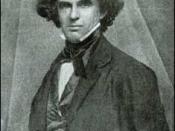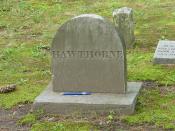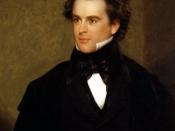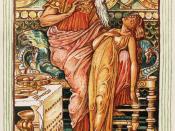The Hollow of the Three Hills is a story of dishonor, deceit, and death. The author, Nathaniel Hawthorn portrays the main character as a beautiful woman with a shameful and abominable past. She tries to run from her problems but comes to find out no matter how big or small a problem, trying to run from it will only make the problem follow.
The main character was so driven by curiosity and remorse that she brought herself to go see a witch. They met in a place described by Hawthorne as "a hollow basin, almost mathematically circular, two or three hundred feet in breadth,...the resort of the Power of Evil and his plighted subjects."(Hawthorne 103) This describes the character as someone who is a plighted subject who had such a secret that she had to be where "no mortal could observe them"(Hawthorne 103) She wanted this witch to help her see and hear what was happening with her loved ones; but she only had one hour to do so and after this one hour she would die Hawthorne did not come out and say this but in saying things like "there is but a short hour that we may tarry here."(Hawthorne
103) and I will do your bidding though I die(Hawthorne 103). She had run from everything that was important to her because the most important, was dying. Hawthorne was not too clear in stating what exactly the problem was but it seemed that her daughter had fallen ill.
Throughout the story Hawthorne masks this fact well and uses foreshadowing nicely. In one part where the main character is looking in on her parents by means of the witches powers and Hawthorne describes her parents as speaking "...of a daughter, a wanderer they knew not where, bearing dishonor along with her, and leaving shame and affliction to bring their gray heads to the grave. They alluded also to other and more recent woe,"(Hawthorne 104) The daughter wandering bearing shame is the main character, who tried to run from her problem which was what they spoke of next. The more recent woe they were alluding to was their granddaughter's death.
Next the main character looked in upon her husband which she had left to bear the brunt of their daughter's mourning. The main character had left her husband all alone in the world except for their dying daughter and was now feeling such remorse that she had to see a witch just to know how he was. He was not well at all, for she had broken his heart and "he spoke of a woman's perfidy, of a wife who had broken her holiest vows"(Hawthorne 104). Not only had she left him with pain and suffering for their child but she had also left him with pain and aversion towards her.
She tried to run away from her daughter's sickness and encroaching death, but by doing so only brought guilt and remorse upon herself. She must have known that her husband would have strong feelings of antipathy towards her and still willingly looked in on his life to see how he was.
The part in the story when she looked back towards her husband was the part of the story that stuck out the most as Nathaniel Hawthorne's style of writing. This was a good example of his 'Puritan Guilt Ethic'. She felt such remorse for leaving that the only good thing to do was to check up on him and see if he was all right. Nathaniel Hawthorne uses the 'Puritan Guilt Ethic' in most of his short stories and novels and this is one example of him using it.
The last thing the woman does out of guilt is checks up on her daughter. The witch uses her powers to allow the main character to look back at her daughter; but when she looks back for her daughter she doesn't see her all she sees is a funeral procession.
The daughter died of her illness as Hawthorne foreshadowed throughout the short story by writing such things as "into the tone of a death bell"(Hawthorne 105) and "like lamplight on the wall of a sepulchre."(Hawthorne 103) The main character left her daughter to die and that is just what happened. Looking back in retrospect the main character probably would have stayed with her daughter.
She cared enough to give her life for just one hour of looking in on the ones she loved and more than likely would have liked to be their with them in this time of mourning.
Not only could she have been there to help them but more importantly they could have been there to help her. As a mother watching her daughter's funeral brigade must have broken her heart but watching it through a witches spell must have shattered it.
Hawthorne's main character chose to run like a coward and in the end paid the worst consequence of all. She gave up her life to witness the pain and suffering she had cause others. With her daughter dead by disease, her husband infuriated with hatred and pain, and her parents filled with disgust and humiliation she had no one that cared about her all because she couldn't handle the emotional stress. How much emotional stress does it seem she caused to others in the end though? She tried to escape her duties as a wife and mother but they just followed her to the very end.





